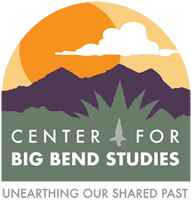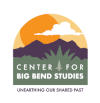2024 Sul Ross-CBBS Archaeological Field School
May 29 to July 5, 2024
6 credit hours (3 ten-day field sessions)
This intensive six-week course provides hands-on introduction to archaeological field and laboratory techniques, including pedestrian survey, site recording, instrument mapping (GPS, EDM), site testing, controlled excavation, rock art recording, photography, 3D modeling, experimental studies, sample processing, and artifact curation. All students receive instruction and experience in all aspects of the field school. Throughout the course there will be several assigned readings and visiting guest lecturers who will provide detailed information about different aspects of the sites and archaeological record of the greater Big Bend. Participation in this course requires hiking across rugged terrain in extreme temperatures, carrying equipment and buckets of sediment, and excavating for extended periods on hands and knees. Please communicate any physical or health concerns with instructors.
The course is split into three 10-day sessions that will run consecutively with four-day breaks in between:
May 29-June7 (Session 1)
June 12-21 (Session 2)
June 26-July 5 (Session 3)


Genevieve Lykes Duncan Site
The first two 10-day sessions will be based around the Genevieve Lykes Duncan site. Previous excavations by the Center for Big Bend Studies at the Genevieve Lykes Duncan site (GLD; 41BS2615) firmly established the presence of deeply buried late Pleistocene/early Holocene Indigenous occupations consisting of multiple earth oven features and associated lithic materials. Ongoing research at GLD by CBBS and the University of Kansas Odyssey Research team has exposed Clovis-age cultural materials stratigraphically beneath the late Pleistocene/early Holocene earth ovens. The block excavation in 2024 will increase our sample of Clovis-age materials and document additional late Pleistocene/early Holocene earth oven features. The discovery of a Clovis-age camp would be the first in the Big Bend region and significant to the larger discussion of First Peoples in North America.
Spirit Eye Cave
The final 10-day session will be based around Spirit Eye Cave. This site has a long history of uncontrolled excavation, but the site contains an incredible assemblage of Pleistocene fauna (ground sloth), perishable artifacts, the oldest dated maize in the Big Bend, and a large earth oven facility at the cave’s mouth. The 2024 Spirit Eye work will resume and extend excavations at the front of the main chamber to evaluate the large oven pit, and we may begin an excavation in the cave interior to sample intact cave deposits. We will excavate the site in rotations, providing students instruction on mapping, digging, and screening in both the front and interior of the cave.

All field work will be based out of field camps (a combination of cabins, bunkrooms, and camping). All students will share cooking and cleaning duties, and the instructors will build a menu to accommodate all food allergies and restrictions. As in professional archaeology settings, helping with camp duties is an expected component of the field school.
The field school application can be downloaded here.
Enrollment is limited to 10 students. Priority deadline for applications is March 15, but applications received after March 15 will be considered depending on the number of applications received prior to March 15. Preference is given to Sul Ross State University students, but any student can apply.
For additional information please contact Dr. Charles Koenig (charles.koenig@sulross.edu, 432-837-8336) or Dr. Devin Pettigrew (devin.pettigrew@sulross.edu, 432-837-8221).
Scholarship Opportunities
Ellen Sue Turner Memorial Fund (CBBS)
Awards vary from $200 to $1,000. Applications due March 15.
Established in 2020, the Ellen Sue Turner Memorial Fund provides funding for undergraduate and graduate students attending the CBBS/SRSU Archaeological Field School. Turner was a Fellow and former president of the Texas Archeological Society. She was the recipient of an Archaeological Lifetime Achievement Award from the Southern Texas Archaeological Association and a recipient of the Curtis Tunnell Lifetime Achievement Award in Archeology from the Texas Historical Commission, and was the author of numerous archaeological publications. Award amounts vary by year.
Application form for CBBS Scholarships can be downloaded here.

The J. Charles Kelley Memorial Field School Scholarship (SRSU)
$1000. Applications due March 15.
Established in 2024 in honor of pioneering archaeologist J. Charles Kelley, this competitive scholarship provides funding for undergraduate and graduate students attending the CBBS/SRSU field school. The J. Charles Kelley scholarship provides $1000 to each recipient to help pay expenses associated with participation in the SRSU/CBBS field school. Non-resident students applying for the field school are encouraged to apply for the J. Charles Kelley Scholarship because it would also provide in-state tuition, further reducing the cost of the field school.
Students who are awarded this scholarship will be directed to an official SRSU portal to complete the award process.
Application form for CBBS Scholarships can be downloaded here.

Archaeological Institute of America Jane C. Waldbaum Archaeological Field School Scholarship
$1000. Application due March 1
Established in 2007 in honor of AIA Honorary President Jane Waldbaum, this scholarship is intended to help students who are planning to participate in archaeological field work for the first time. Students majoring in archaeology or related disciplines are especially encouraged to apply. The Scholarship Fund provides $1000 each to help pay expenses associated with participation in an archaeological field work project (minimum stay one month/4 weeks).

